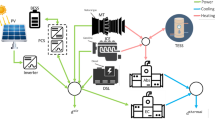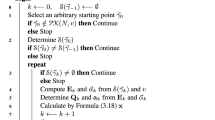Abstract
Computational Grid is a well-established platform that gives an assurance to provide a vast range of heterogeneous resources for high performance computing. Efficient and effective resource management and Grid job scheduling are key requirements in order to optimize the use of the resources and to take full advantage from Grid systems. In this paper, we study the job scheduling problem in Computational Grid by using a game-theoretic approach. Grid resources are usually owned by different organizations which may have different and possibly conflicting concerns. Thus it is a crucial objective to analyze potential scenarios where selfish or cooperative behaviors of organizations impact heavily on global Grid efficiency. To this purpose, we formulate a repeated non-cooperative job scheduling game, whose players are Grid sites and whose strategies are scheduling algorithms. We exploit the concept of Nash equilibrium to express a situation in which no player can gain any profit by unilaterally changing its strategy. We extend and complement our previous work by showing whether, under certain circumstances, each investigated strategy is a Nash equilibrium or not. In the negative case we give a counter-example, in the positive case we either give a formal proof or motivate our conjecture by experimental results supported by simulations and exhaustive search.
Similar content being viewed by others
References
Arezzini, S., Boccali, T., Calzolari, F., Ciampa, A., Marini, S., Mazzoni, E., Sarkar, S., Taneja, S., Terreni, G.: Il Grid Data Center Dell’INFN di Pisa. Internal report. http://www.lnf.infn.it/sis/preprint/pdf/getfile.php?filename=INFN-CCR-09-2.pdf. Accessed 25 Aug 2012
Armstrong, P., Agarwal, A., Bishop, A., Charbonneau, A., Desmarais, R., Fransham, K., Hill, N., Gable, I., Gaudet, S., Goliath, S., Impey, R., Leavett-Brown, C., Ouellete, J., Paterson, M., Pritchet, C., Penfold-Brown, D., Podaima, W., Schade, D., Sobie, R.J.: Cloud Scheduler: a resource manager for distributed compute clouds. In: CoRR, vol. 1007.0050 (2010)
Buscemi, M.G., Montanari, U., Taneja, S.: Toward a game-theoretic model of Grid systems. In: Post-Proceedings of the 5th Symposium on Trustworthy Global Computing. Lecture Notes in Computer Science 6084, pp. 57–72. Springer, Berlin (2010)
Cohen, J., Cordeiro, D., Trystram, D., Wagner, F.: Coordination mechanisms for selfish multi-organization scheduling. In: 18th International Conference on High Performance Computing (HiPC), pp. 18–21 (2011)
Foster, I.T., Kesselman, C.: The Grid, Blueprint for a New Computing Infrastructure. Morgan Kaufmann (1999)
Foster, I., Zhao, Y., Raicu, I., Lu, S.: Cloud computing and Grid computing 360-degree compared. In: Grid Computing Environments Workshop, pp. 1–10. GCE (2008)
Galstyan, A., Czajkowski, K., Lerman, K.: Resource allocation in the Grid with learning agents. J. Grid Computing 3(1–2), 91–100 (2005)
gLite Middleware. http://glite.cern.ch/. Accessed 25 Aug 2012
Grosu, D., Chronopoulos, A.T.: Noncooperative load balancing in distributed systems. J. Parallel Distrib. Comput. 65, 1022–1034 (2005)
Keller, R.M.: Formal verification of parallel programs. Commun. ACM 19(7), 371–384 (1976)
Kwok, Y., Song, S., Hwang, K.: Selfish Grid computing: game-theoretic modeling and NAS performance results. In: Proceedings of IEEE/ACM International Symposium on Cluster, Cloud, and Grid Computing, pp. 9–12. IEEE Computer Society Press, Los Alamitos (2005)
Milgrom, P.R.: Putting auction theory to work. In: Churchill Lectures in Economics. Cambridge University Press, Cambridge (2004)
Nash, J.: Non-cooperative games. Ann. Math. 54(2), 286–295 (1951)
Nisan, N.: Algorithmic Game Theory. Cambridge University Press, Cambridge (2007)
Open Nebula. http://opennebula.org/. Accessed 25 Aug 2012
Osborne, M.J.: An Introduction to Game Theory. Oxford Univ. Press, New York (2004)
Pascual, F., Rzadca, K., Trystram, D.: Cooperation in multi-organization scheduling. Concurrency Computat. Pract. Exper. 21(7), 905–921 (2009)
Regev, O., Nisan, N.: The POPCORN market—an online market for computational resources. In: Proceedings of the First International Conference on Information and Computation Economies, pp. 148–157. ACM (1998)
Rzadca, K., Trystram, D., Wierzbicki, A.: Fair game-theoretic resource management in dedicated Grids. In: Proceedings of IEEE/ACM International Symposium on Cluster, Cloud, and Grid Computing, pp. 343–350. IEEE Computer Society (2007)
Song, S., Hwang, K., Kwok, Y.: Trusted Grid computing with security binding and trust integration. J. Grid Computing 3(1–2), 53–73 (2005)
Subrata, R., Zomaya, A.Y., Landfeldt, B.: A cooperative game framework for QoS guided job allocation schemes in Grids. IEEE Trans. Comput. 57(10), 1413–1422 (2008)
Wiriyaprasit, S., Muangsin, V.: The impact of local priority policies on Grid scheduling performance and an adaptive policy-based Grid scheduling algorithm. In: Proceedings of International Conference on High Performance Computing and Grid in Asia Pacific Region, pp. 343–346. IEEE Computer Society (2004)
Worldwide LHC Computing Grid. http://lcg.web.cern.ch/LCG/public/. Accessed 25 Aug 2012
Author information
Authors and Affiliations
Corresponding author
Additional information
Work partially funded by the EU IST Project ASCENS.
Rights and permissions
About this article
Cite this article
Buscemi, M.G., Montanari, U. & Taneja, S. A Game-Theoretic Analysis of Grid Job Scheduling. J Grid Computing 10, 501–519 (2012). https://doi.org/10.1007/s10723-012-9228-1
Received:
Accepted:
Published:
Issue Date:
DOI: https://doi.org/10.1007/s10723-012-9228-1




